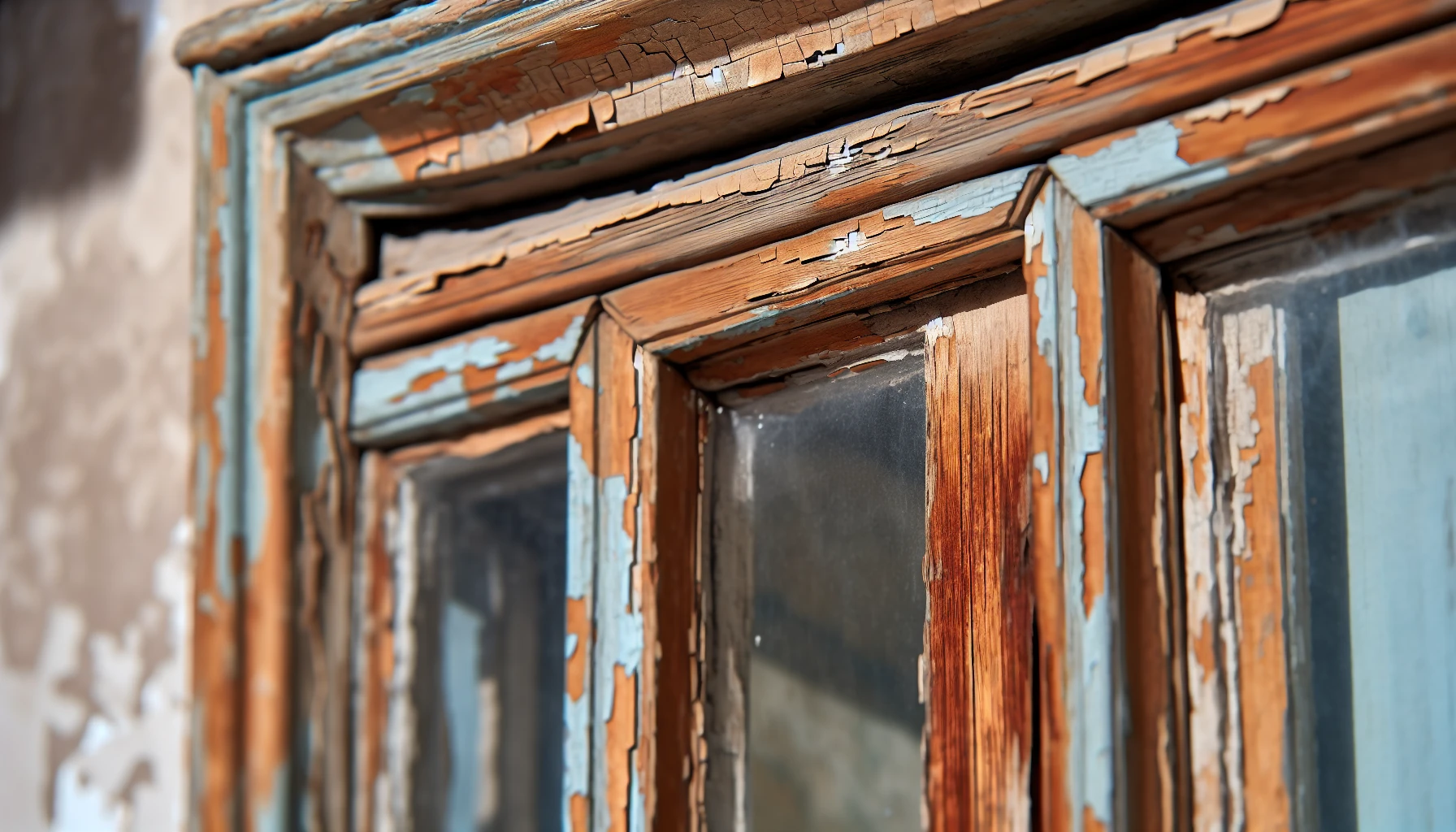The Ultimate Guide to Replace Windows: Styles, Costs, and Installation Tips
Replacing windows in your home is more than just a cosmetic upgrade; it’s an investment in the comfort, energy efficiency, and overall value of your property. This comprehensive guide will walk you through the essential aspects of window replacement, from understanding the need to replace windows to selecting the right materials and style to suit your needs. Let’s jump right in!
Key Takeaways
- Window replacement can provide numerous benefits to a home, but it is important to consider factors such as material, style and energy efficiency.
- When choosing a window brand for your home, compare the offerings of top brands in terms of features, ratings and customization options.
- Strategies to reduce costs include retrofit installation, bulk discounts and scheduling during off peak season.
Understanding the Need for Window Replacement

A wooden window frame with cracked paint and signs of aging
Window replacement may become necessary for various reasons, such as age, damage, or lack of energy efficiency in existing windows. To avoid further problems and save money over time, it’s necessary to identify the signs of window deterioration. Fogging, frame deterioration, and air infiltration in the interior are some indicators that suggest it’s time to replace your windows.
Installing replacement windows brings multiple benefits to your home. These include increased acoustic insulation, reduced air leakage, improved comfort, and an enhanced exterior aesthetic. When it comes to window replacement, you’ll encounter two main types: typical replacement windows and new-construction windows. The former is designed to fit within the existing window frame, while the latter necessitates the removal of the entire old window, including the frame, sill, and trim.
Keep in mind that all windows are not made the same. Different window styles, materials, and energy efficiency ratings can significantly impact the performance and longevity of your new windows. Doing a comprehensive study and understanding your specific needs will help you make a well-considered decision about replacing your windows.
Choosing the Right Window Style

A variety of window styles including double-hung, casement, and bay windows
Window styles vary, and the right choice for your home will depend on factors such as aesthetics, functionality, and energy efficiency. Some popular window styles include:
- Double-hung windows
- Casement windows
- Sliding windows
- Bay windows
Double-hung windows are a common choice, offering versatility and ease of maintenance.
When selecting a window style, consider factors like energy efficiency, available styles and features, and the cost of the windows. For example, double-hung windows should effectively block out cold air or water, especially if you live in an area prone to chilly and windy or rainy weather.
Top window brands such as Andersen, Marvin, and Pella offer a range of window styles and customization options, including composite windows. Andersen windows, for example, feature various construction materials like wood, clad, vinyl, and composite, along with low-E and argon-filled glass for enhanced energy efficiency. By comparing various brands and what they offer, you’ll be able to find the right match for your home and budget.
Window Frame Material Options

A comparison of window frame materials including wood, vinyl, and aluminum
The window frame material plays a significant role in the overall performance, durability, and maintenance requirements of your windows. Common window frame materials include:
- Wood
- Vinyl
- Aluminum
- Composite
Each material has its own set of advantages and disadvantages.
Wood window frames offer a classic and customizable aesthetic, often favored in luxury and historic dwellings. Window materials other than these require less upkeep. However, they have their own set of limitations..
Vinyl window frames are cost-effective, long-lasting, and relatively easy to clean. However, they may not offer the same level of aesthetic appeal as wooden frames.
Aluminum window frames may not be as energy-efficient as other materials, especially if an insulated barrier is not present within the frame.
On the other hand, fiberglass window frames are highly insulating, weather-resistant, low-maintenance, and fairly energy-efficient while offering the ability to mimic other materials’ appearance.
Glazing and Energy Efficiency Choices

A cross-section of a double-pane energy-efficient window
Besides the style and frame material of the window, glazing options significantly influence the insulation and energy efficiency of your windows. Double or triple-pane windows, as well as energy-efficient coatings, can significantly improve insulation and reduce energy costs.
Double-pane windows are a popular choice, with costs ranging from $450 to $1,000 per window. They offer better insulation than single-pane windows, which cost between $150 and $400 per window. Some window brands, such as Atrium, offer advanced glazing options like low-emissivity (low-E), argon-filled, and triple-pane glass.
When selecting energy-efficient windows, look for the Energy Star certification label. The Environmental Protection Agency administers the Energy Star program. It estimates that with the installation of Energy Star certified windows, the average homeowner can reduce their home energy bills by 12 to 13 percent.
Professional vs. DIY Installation
Although installing windows yourself might seem like a way to save money, it is usually better to hire a professional installer because of the complex nature of the task, warranties, and assured results. Professional window installers ensure that the window is securely sealed to avoid air leakage and drafts.
To find a certified window installer, you can ask for referrals from friends and neighbors, consult window manufacturers, or check with home improvement stores like The Home Depot and Lowe’s. It’s important to get estimates from several window companies to compare costs and services before deciding.
Some window installation companies, like CoMo Premium Exteriors, offer the following services:
- Free estimates
- Expert support and guidance throughout the installation process
- Professional installation services for windows and doors
- Experienced installers ensuring a smooth and efficient window replacement process.
Factors Affecting Window Replacement Costs
Knowing what factors influence window replacement costs can help you plan your budget and make well-considered decisions. Factors that influence window replacement costs include:
- Window type
- Material
- Labor
- Location
- Additional services like disposal and structural repairs.
Window frame materials can significantly impact the window replacement cost. For example, wood windows can range from $250 to $800, while vinyl windows can cost between $80 and $500. Aluminum windows can be more expensive, with prices ranging from $400 to $1,300.
The style and features of the windows also contribute to the overall cost. Custom windows, for instance, may come with a higher price tag than standard window styles. Windows that are energy-efficient may have a higher initial cost. However, they could potentially save you money on energy bills in the long term.
Top Window Brands to Consider
Finding the right window brand for your home is essential for ensuring quality and longevity. Some of the top window brands in the market are:
- Renewal by Andersen
- Champion
- Window Nation
- Universal Windows Direct
- Pella
- Marvin
- Harvey
- Simonton Windows
- The Home Depot
These brands were selected based on their product offerings, warranties, years of experience, and customer reputation.
Different window brands offer various features, such as:
- Energy efficiency
- Durability
- Customizable options
- Suitability for specific environments like coastal homes
- Specialized warranty coverage
- Cutting-edge window designs
It’s important to study and compare these leading window brands to find the perfect fit for your needs and budget. Consider factors like:
- Energy efficiency ratings
- Materials
- Styles
- Customization options
when making your decision.
Tips for Reducing Window Replacement Costs
There are several ways to reduce window replacement costs without compromising on quality. One option is retrofit installation, where new windows are installed within the existing window frame, providing an efficient and cost-effective replacement method.
Another tip is to inquire about bulk discounts when purchasing multiple windows. Some companies offer wholesale pricing for bulk purchases, which could result in significant savings. Comparing prices between different suppliers or manufacturers can also help you find the best deal.
Scheduling your window replacement during the off-peak season, such as winter, may also help you save money. Discounts or promotions may be available during these times, and window installers may be more readily available for your project.
Preparing Your Home for Window Replacement
Appropriate preparation is necessary for a seamless window replacement process. Start by clearing the area around your windows, removing any obstacles that could hinder the installers’ access to the windows. Take down curtains, drapes, blinds, and other window treatments following the manufacturer’s instructions.
Ensure that the window installers have unobstructed access to the designated areas in your home. If you’re planning other upgrades or renovations, it’s a good idea to complete them before replacing the windows to reduce disruption.
Summary
In conclusion, window replacement is an important investment in your home’s comfort, energy efficiency, and overall value. By carefully considering factors like window style, frame material, glazing options, and installation methods, you can make an informed decision that meets your needs and budget. Don’t forget to research and compare top window brands and follow our tips for reducing window replacement costs. Now you’re well-equipped to embark on this home improvement project with confidence!
Frequently Asked Questions
Is it cheaper to replace all windows at once?
It can be cheaper to replace all windows at once due to bulk pricing offers from window replacement companies. This can result in significant cost savings over the years, compared to replacing a few windows at a time.
Does replacing windows increase home value?
Replacing windows can be a costly project, but it pays off by adding an average of $13,766 in value to your home, approximately 69% of the project cost.
What are the benefits of installing energy-efficient windows?
Installing energy-efficient windows can help reduce energy costs, improve insulation, and increase comfort in your home.
What factors should I consider when choosing a window style for my home?
When choosing a window style for your home, take into account aesthetics, functionality, and energy efficiency to ensure the best result.
How do I find a certified window installer?
Finding a certified window installer can be achieved through referrals from trusted sources such as friends, neighbors or reputable manufacturers and stores.

